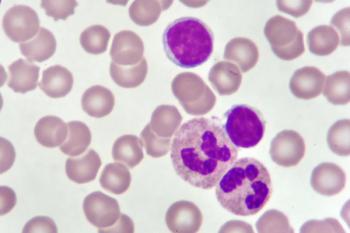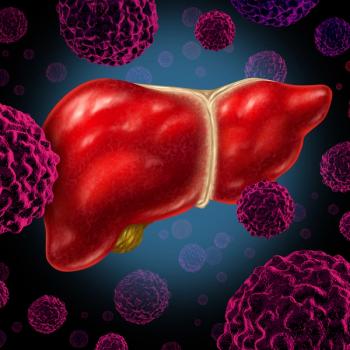
Based on results from the phase 2 GARNET trial, dostarlimab may be used to treat recurrent or advanced endometrial cancer progressing on or after treatment with a platinum-containing chemotherapy that is mismatch repair deficient.

Your AI-Trained Oncology Knowledge Connection!


Based on results from the phase 2 GARNET trial, dostarlimab may be used to treat recurrent or advanced endometrial cancer progressing on or after treatment with a platinum-containing chemotherapy that is mismatch repair deficient.

Based on positive results of the phase 2 FIGHT trial, the FDA has granted the investigation antibody bemarituzumab plus FOLFOX6 breakthrough therapy designation for the treatment of locally advanced or metastatic gastric and gastroesophageal junction adenocarcinoma with FGFFR2b overexpression in the frontline setting.

Based on results from the EV-301 and EV-201 trials, 2 separate applications for enfortumab vedotin as therapy for certain patients with previously treated metastatic urothelial carcinoma were accepted by the FDA and granted priority review.

Darovasertib as monotherapy for the treatment for patients with heavily pretreated metastatic uveal melanoma induced responses and promising rates of overall survival, according to preliminary data from a phase 1/2 trial.

Interim analysis of the phase 3 LUNAR trial led to a data monitoring committee recommendation to reduce the trial sample size due to strongly positive results gathered from the current patient population treated with tumor-treating fields.

In a sample of patients with comorbid conditions that included patients with cancer, nearly 20% of patients reported having reservations about receiving the COVID-19 vaccine.

Based on results of the phase 2 TROPHY-U-01 trial, the FDA has given accelerated approval to sacituzumab govitecan for previously treated, locally advanced or metastatic urothelial carcinoma.

In an analysis of a cohort of patients treated with atezolizumab in the myPathway trial, a tumor mutational burden cutoff of 16 mutations per megabase or higher was key for achieving durable responses in various solid tumors.

During a presentation at the American Association of Cancer Research Annual Meeting 2021, Ben L. Kong, PharmD, described the SMMART program, which pairs genetic and clinical information to find the best therapies for patients with breast cancer who progress on standard therapies.

Based on results of the phase 2 innovaTV 204 trial, the FDA granted priority review to tisotumab vedotin as a potential therapy for patients with recurrent or metastatic cervical cancer with disease progression on or after chemotherapy.

CD19-directed CAR T-cell therapy brexucabtagene autoleucel will be considered by FDA for indication in adults with B-cell precursor acute lymphoblastic leukemia.

An analysis of real-world outcomes in a cohort of patients treated in mostly community settings showed that palbociclib plus letrozole improved both progression-free and overall survival in women with hormone receptor–positive, HER2-negative metastatic breast cancer.

A second-generation human adenovirus 5 immunotherapy vaccine has activity in patients with metastatic castration-resistant prostate cancer who are not responding to other available therapies.

Screening patients for molecular response using the Guardant360 assay provides an early signal of antitumor activity for pembrolizumab-based treatment of non–small cell lung cancer.

CancerNetwork® reports on updates in prevention and earlier diagnosis of colorectal, breast, and other cancers.

Data that led to the approval of umbralisib in patients with indolent non-Hodgkin lymphoma— including follicular lymphoma and marginal zone lymphoma—indicates favorable activity of the therapy versus other available PI3K inhibitors.

In a dose-finding trial, TPX-0046 elicited responses in patients with non–small cell lung cancer and medullary thyroid cancer who were naïve to prior tyrosine kinase inhibitors and whose tumors harbored alterations in RET.

A higher mutational load detected by whole-genome sequencing in patients with multiple myeloma precursor conditions was likely predictive of subsequent disease progression.

The next-generation cryoablation technology ProSense was granted breakthrough device designation to treat certain patients with T1 breast tumors.

With more than 5 years of follow-up, results from the SOLO2 trial of olaparib maintenance in relapsed, high-grade serous or endometrioid ovarian cancer, including primary peritoneal or fallopian tube cancer, were reported and showed superiority of the agent over placebo.

In a retrospective review published in NPJ Breast Cancer, data indicate that omitting radiation therapy results in decreased overall survival in patients with stage I HER2-positive breast cancer.

Despite the success of immune checkpoint blockade in the treatment of recurrent or metastatic head and neck squamous cell carcinoma, the use of the PD-L1 inhibitor avelumab failed to prolong progression-free survival for patients with locally advanced disease.

A new imaging technique that pairs acoustic resolution photoacoustic microscopy co-registered with ultrasound and an artificial intelligence neural network was proven feasible for use in detecting residual tumor tissue in patients with rectal cancer.

Phase 2 trial data support the FDA breakthrough therapy designation for futibatinib in cholangiocarcinoma tumors positive for FGFR2 gene fusions and rearrangements.

According to a single-institution study of patients with a known or suspected diagnosis of AML or MDS, whole-genome sequencing may provide better predictive ability of patients’ risk status than traditional methods.

Thomas J. Eichler, MD, FASTRO, presented data during a media briefing from surveys of radiation oncologists treating patients with cancer through the COVID-19 pandemic.

The presence of certain genetic alterations in circulating tumor cells in patients with metastatic castration-resistant prostate cancer were associated with response or resistance to AR inhibitors, according to a recent study.

The agent annamycin, which offers the potential to fulfill unmet medical needs of traditional anthracyclines, has been granted fast track designation for the treatment of soft tissue sarcoma lung metastases.

The FDA’s Oncologic Drugs Advisory Committee voted in favor of waiting for additional event-free survival data to become available before making a regulatory decision regarding a biologics license application for pembrolizumab in early triple-negative breast cancer.

An investigational KRAS G12C inhibitor for treating patients with non–small cell lung cancer demonstrates high response rates in pretreated disease and infers viability of this therapy approach.